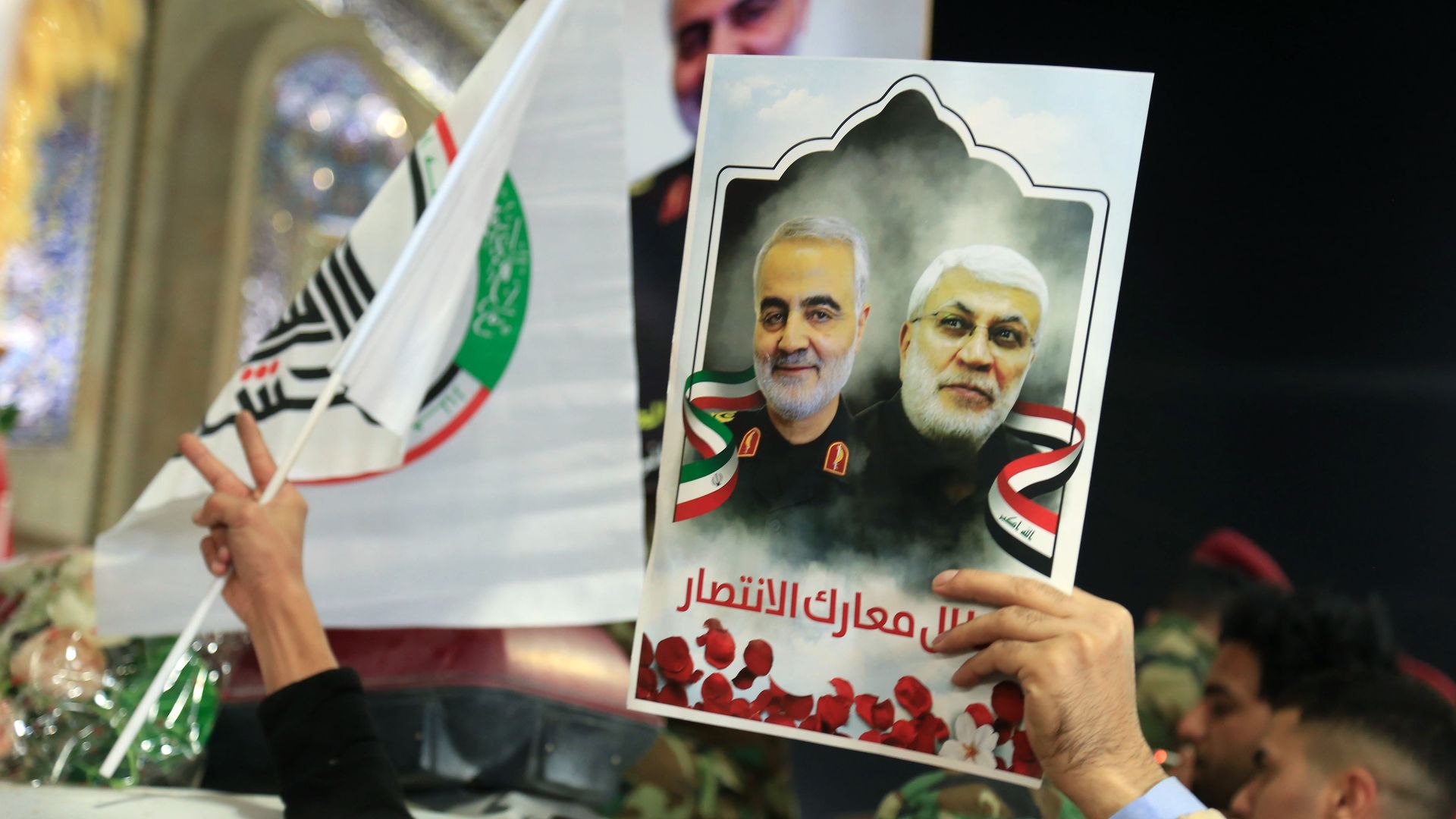The latest: Iran general who replaced Soleimani vows revenge for death
Add Axios as your preferred source to
see more of our stories on Google.

Photo: Mohammed Sawaf/AFP via Getty Images
Iran's new top commander Esmail Ghaani, who replaced Gen. Qasem Soleimani after he died in a U.S. airstrike in Iraq, pledged during a televised address Monday to avenge the general's killing, AP reports.
The latest: Ghaani‘s declaration that God "has promised to get his revenge" and that "certainly actions will be taken" came hours after Iran said it would no longer abide by limits on its uranium enrichment and Iraq's parliament voted to call on the Iraqi government to expel U.S. troops from the country over Friday's airstrike.
Why it matters: Friday's drone strike that killed Soleimani is the most direct confrontation from the U.S. since the Trump administration withdrew from the 2015 Iran nuclear deal. Per AP, the latest developments could bring Tehran nearer to creating an atomic bomb, see a proxy or military attack on the U.S. from Iran and enable an Islamic State resurgence in Iraq, making the region more dangerous.
- President Trump has been criticized for the strike by some world leaders and Congress members — including House Speaker Nancy Pelosi, who said she'll introduce a vote this week on a War Powers Resolution in an attempt to limit his action on Iran.
- Trump doubled down Sunday on his threat to target 52 Iranian sites and threatened to hit Iraq with sanctions over the parliamentary vote.
The big picture: Attacking cultural sites is considered a war crime under the 1954 Hague treaty — something Iranian officials including Foreign Minister Mohammad Javad Zarif and Hossein Dehghan, the military adviser to Supreme Leader Ayatollah Ali Khamenei, have noted.
- Dehghan told CNN Iran would target U.S. military sites in response to the killings of Soleimani and Abu Mahdi al-Muhandis, a senior Iraqi-Iranian militia commander. Iran is holding funerals in several cities for them this week.
The decision to strike: U.S. officials say they acted following the death of an American contractor the Friday before Christmas in Iraq by Iranian-sponsored militia groups. Secretary of State Mike Pompeo claimed Soleimani was "actively" planning an attack on Americans, the Post reports.
- Trump said he's not looking to change the Iranian regime, per the New York Times.
Attack fallout in Iraq: Iraqi officials and Iranian-backed militias reported another deadly airstrike in Iraq 24 hours after the U.S. killed Soleimani, AP reports. It left five dead, as thousands gathered in Baghdad Saturday to mourn Soleimani and al-Muhandis.
- On Saturday, several rockets fell inside Baghdad's fortified Green Zone, the Jadriya neighborhood and the Balad air base housing U.S. troops, but there were no reported deaths, the Iraqi military said, per Al Jazeera.
- NATO has suspended training missions in Iraq after Soleimani's death, citing security concerns, the Washington Post reports.
Global reaction:
- Iraqi Prime Minister Adel Abdul-Mahdi, who formally resigned a month ago, said the attack will lead to a "dangerous escalation," NPR reports.
- British Prime Minister Boris Johnson, German Chancellor Angela Merkel and French President Emmanuel Macron issued a joint statement, calling for "all parties to "exercise restraint."
- Russia condemned the attack and blasted the Trump administration for refusing to use official channels, such as the UN Security Council following protests at American embassies in Iraq, per NPR.
- Israeli Prime Minister Benjamin Netanyahu supported the U.S. and said, "Qassim Soleimani is responsible for the deaths of many American citizens and many other innocent people," the BBC reports.
- China appealed for restraint on all sides, but added, "The dangerous [U.S.] military operation violates the basic norms of international relations and will aggravate regional tensions and turbulence," per Al Jazeera.
What's next: The White House is preparing to present allies with intelligence on the "imminent threat" it says prompted this attack, said Kirsten Fontenrose, who served on the National Security Council earlier in the Trump administration, during an Atlantic Council conference call.
- The administration is sending more U.S. troops to the region, with roughly 3,500 troops in Fort Bragg, North Carolina, preparing to go to Kuwait.
Go deeper:
Editor's note: This article has been updated with new details throughout.

